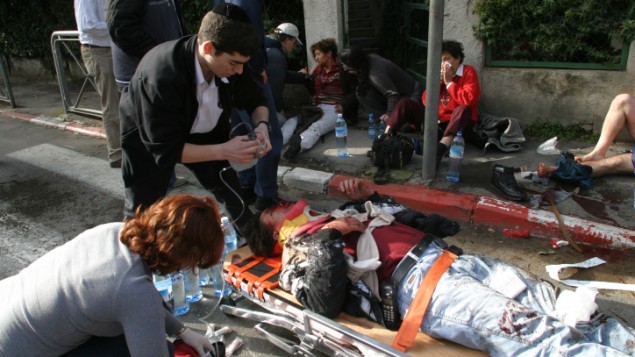A new bill that would permit Israel to withhold payments to the Palestinian Authority in order to halt terror salaries advanced through a first reading in the Knesset on Monday.
By: Alex Traiman/JNS.org
A bill to offset payments made to the Palestinian Authority each month by Israel by those amounts that are subsequently paid out to jailed terrorists or to the families of terrorists killed in the act of attempted murder advanced through its first reading in the Knesset Monday. The second and third readings of the bill are expected within the next two weeks.
Passage of the bill will reduce the amount of money the P.A. receives each month from Israel by approximately NIS 150 million ($42 million) per month, which is approximately a quarter of the P.A.’s monthly allocation, unless it can prove that terrorists and their families are no longer receiving monthly stipends.
As part of the financial arrangements set during the signing of the Oslo Accords, Israel collects tax and customs revenues on imported items on behalf of the P.A. at ports of entry. Israel then passes the collected sums to the P.A.
Yet for nearly 10 years, the P.A. has dedicated a significant portion of its budget to directly incentivize the murder of Jews through stipends to terrorists and their families. In their 2018 budget, the P.A. allocated $360 million for the Prisoners and Martyrs fund, which disperses payment to imprisoned terrorists, released terrorists and the families of dead terrorists. The situation is often called “pay to slay.”
Knesset member Elazar Stern noted that he initiated the bill “to prevent the absurd situation in which terrorists with blood on their hands receive proper salaries from the Palestinian Authority during their trials and while in prison.”
He says the current terror stipend payment scheme, which often pays above-average monthly salaries for life to terrorists jailed for the most heinous crimes, “encourages others to carry out acts of terror and must be stopped.”
Once passed, Stern notes, “The law will correct an injustice of historic proportions. Passage of this law will reduce terrorism, and perhaps more importantly, restores the most basic moral values necessary in every civilized society. I have no doubt that reducing terrorism improves the prospects for peace.”
Stern, whose Yesh Atid Party is in the opposition, first initiated the “law to offset money to the P.A. for its support of terrorism” more than a year ago. Yet the bill stalled in ministerial committee, as the government worked on its own version of the law, advanced by Defense Minister Avigdor Lieberman.
The government’s proposed law included a waiver loophole that would allow the executive branch of Israel’s government to pass funds for security considerations, even if the P.A. continued to pay terror salaries. Proponents of the waiver argued that withholding funds from the P.A. would spark a financial crisis that could ultimately lead to the authority’s collapse.
‘Committee members fed up with the government’
Maurice Hirsch, director of legal initiatives for Palestinian Media Watch, a nonprofit organization that has been tracking the sophisticated terror payment scheme and linking up specific payments with specific terrorists or their families, said that since Stern’s law was first initiated, some NIS 1.5 billion ($420 million) had been paid out to terrorists and their families, at a clip of approximately NIS 100 million ($28 million) per month.
“That’s what the government and their procrastination has allowed to go to terrorists in the last year,” said Hirsch.
He noted that “when Israel’s government ordered soldiers to use lethal force to stop infiltrations rioting along the Gaza border, the families of those killed will now receive lifetime stipends from the Palestinian Authority, and it is the government’s procrastination in advancing the law that is allowing that.”
At Monday’s committee meeting, “committee members got fed up with the government and the fact they got no counter offer from the government to deal with the waiver,” said Hirsch.
At the meeting, committee chairman Avi Dichter reportedly called for Stern’s version of the bill to be passed “without any waiver whatsoever.”
“It makes no sense how such a bill went without being legislated for so long,” said Stern.
Funds for justice, not terror
According to Stern’s version of the bill, funds that are withheld from payment to the P.A. will be put into a fund that will be used to pay out financial judgements to victims of terror, instead of to the perpetrators.
“This is a great day and really brings justice to the idea of Palestinians paying salaries to terrorists. Instead, those funds will go to victims of terrorism,” said Hirsch.
A similar bill was passed in March in the United States. The Taylor Force Act prohibits the United States from passing any financial aid to the P.A. as long as any payments to terrorists are made. While the U.S. bill is scheduled to go into effect in the coming weeks, Israel still lags behind.
This past week, Israeli Prime Minister Benjamin Netanyahu vowed that damage caused by Gaza rioters to key infrastructure, including gas and electricity lines that ultimately service Gazan residents, would also be offset from payments to the P.A.
While Stern and Hirsch both expect the law to pass its upcoming second and third readings, questions remain as to how soon the funds will actually be withheld. Hirsch said the law calls for an annual review of terror payments to determine the amounts of funds to be withheld.
“The law will probably rise to second and third readings in the plenum next Monday,” said Stern. “Then it takes a few weeks for the bill to be officially entered into law. Theoretically from that point, it can already be applied, but it can take longer if the High Court of Justice opposes it.”





